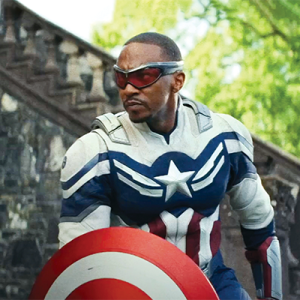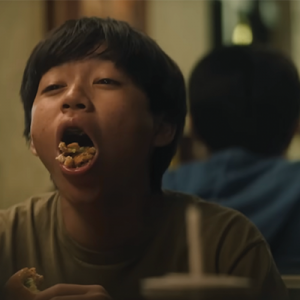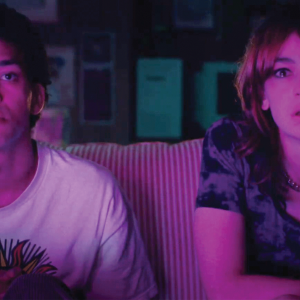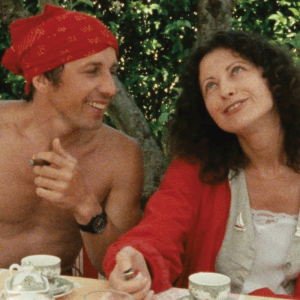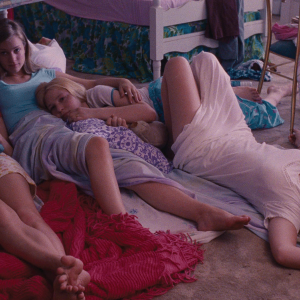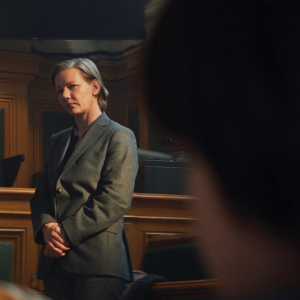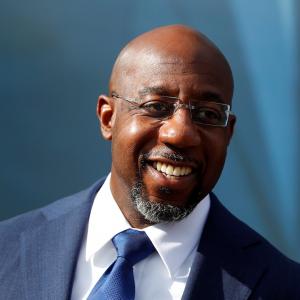
Curtis Yee is a reporter and critic living in Washington, D.C. He covers faith, society, and everything in between. Follow him on Twitter @curtisfyee.
Posts By This Author
Captain America’s Identity Crisis
THE CAPTAIN AMERICAseries has always been a bright spot in the Marvel Cinematic Universe. Sure, they’re big blockbuster fun, but they’ve also been willing to do what political thrillers do best: Consider the questions of power. Previous entries have interrogated the perils of the surveillance state and the historic experimentation done on Black soldiers, political waters that few MCU projects have ventured into.
Which is why it’s such a shame that Captain America: Brave New World — hampered by reshoots, strikes, protests, and a tepid rollout amid Donald J. Trump’s reascendance to the presidency — offers only the veneer of substance.
When President Thaddeus “Thunderbolt” Ross (Harrison Ford) asks newly christened Captain America Sam Wilson (Anthony Mackie) to restart The Avengers, Wilson is apprehensive. Ross, a former military general, helped dismantle the team in Captain America: Civil War, imprisoning Wilson and other heroes. But when U.S. operatives attempt to assassinate Ross, Wilson must work with the increasingly untethered president to uncover who’s behind the plot.
A film about the tension between serving your country and serving your president, particularly in our current moment where paranoia and disunity reign, is rich with possibility. But instead of engaging these pertinent issues, the film seems to wave away concerns about the danger of political power, filling its runtime with clunky dialogue that alludes to complex ideas without engaging them, lest they reduce the film’s marketability.
Surreal Art for a Surreal World
JEAN-LUC GODARD'S 1967 anti-consumerist film Weekend is difficult to explain in the space of a column, but a single scene offers a cross-section of its absurdity.
A bourgeois married couple begin a road trip to kill the wife’s parents and inherit their fortune. Naturally, once the deed is done, they each intend to kill the other and run off with their respective lovers. But first, they must maneuver traffic.
A country road is frozen in bumper-to-bumper traffic, and for nine excruciating and exhilarating minutes, the camera methodically tracks along the road, gawking at the jam. Some people play chess in the roadway while others toss bouncy balls between vehicles; children have emptied out of a school bus and run through the grass; there are lions, a llama, monkeys; people lounge and flirt as the couple weaves through the mess. The scene is made even more chaotic by the insatiable, mechanical wail of competing car horns and screaming squabbles.
Growing Pains
THERE IS SOMETHING horrendous about the politics of being 13 — the raging hormones, the prepubescent brinkmanship; nobody knows what they’re doing, and everyone wants you to think that they do. Such is the case for Chris Wang (played by Izaac Wang), aka Wang Wang, aka Dìdi, aka Half-Asian Chris (he’s not actually half-Asian). Chris is having a bit of an identity crisis.
Director Sean Wang’s Dìdi is a love letter to adolescence rendered with painstaking specificity, a period piece set in his own childhood home of Fremont, Calif., during the era of T9 texting and AOL instant messenger.
It’s the summer before freshman year in 2008 and Chris is getting into shenanigans: skating with his friends, wondering if he should send a :) or a ;) to his crush, and generally feeling emotions nobody else could possibly understand. Plus, his mother keeps arguing with his grandmother and asking if he’s feeling sad — so annoying. And his sister, who sucks, obviously, is leaving for college, but at least she has good taste in music (or rather, she likes the same music as Chris’ crush).
There is such frenetic volatility to early adolescence.
‘I Saw the TV Glow’ Warns of the Toll of Inaction
IT'S HARD TO understand what motivates Owen, in part because he is almost always alone. The lead in I Saw the TV Glow (played by Ian Foreman and later Justice Smith) is near-always inert, save for when it comes to his favorite television show: The Pink Opaque.
When the lonely seventh grader discovers that a disaffected girl two grades older than him, Maddy (Brigette Lundy-Paine), also stays up late to watch the monster of the week show, he sneaks out to watch it with her. It is one of the most radical acts he takes.
Set in an anonymous suburb in 1996, the two gather every Friday to watch the show, a Buffy the Vampire Slayer and Twin Peaks composite about supernaturally empowered teens who defend their suburban county against the evil Mr. Melancholy. Together they fall into the show’s immersive lore to escape their own hardships — an abusive stepfather, a chronically ill mother. As Maddy explains, the show “feels more real than real life.”
The Persistence of Life’s Mundane Beauties
THERE IS SOMETHING outré about summertime sadness. As foliage reaches its lushest form and the sun turns our skin dewy, nature summons its full potential to evoke enchantment. And yet, we often find ourselves standing obstinate in the face of God’s good favor.
Such is the case for Delphine in Éric Rohmer’s 1986 French drama, The Green Ray. Newly separated from her fiancé and ditched by a friend she was supposed to vacation with, Delphine (Marie Ri-vière) is suddenly alone in Paris as the city’s leisure class flees for more temperate summer climates. Failed attempts at companionship find her isolated or, worse, at the mercy of dining companions who take on the role of Job’s friends, psychoanalyzing her disposition and insisting she just needs to get out more. Despite all efforts, Delphine is disenchanted.
Indifference Is a Cursed Heirloom
THE REMAINING LISBON sister are sprawled in their bedroom when the priest knocks on their door.
“Hello girls, I thought we could talk. Do you feel like talking?”
Their returning stares are vacant and unknowable, and the priest wears only the pretense of concern. Both parties maintain their false decorum, neither fully able to acknowledge their shared grief: the suicide of Cecilia, the youngest Lisbon sister, only 13 years old.
Reaching a Verdict in the Absence of Proof
THE FIRST TIME we see Samuel Maleski (Samuel Theis), he is lying in the snow outside his home, blood pooling at his head. Across French director Justine Triet’s mystery Anatomy of a Fall, the cause of Samuel’s untimely death will be debated ad nauseam. Was it suicide? Or was it murder?
Samuel’s wife, Sandra (Sandra Hüller), a successful writer, becomes the state’s prime suspect, and his 11-year-old son Daniel (Milo Machado Graner), who has limited vision, is the only witness. Viewed through the lens of a whodunit courtroom procedural, one might expect the film to track the facts to a clear truth. But as lawyers and experts atomize the scene — a spatter of blood here, an open window there — a lack of physical evidence pushes the prosecution to lean on emotional appeals, building a case for murder around the circumstances of Samuel and Sandra’s flailing marriage.
When Christian News Falls Into the Trap of ‘Impartiality’
When I spoke over video call with CEO and editor-in-chief Jason Woodruff in June, he told me that The Pour Over was founded out of “a lack of better options.”
“Traditional news sources promote obsession, they promote anger, they promote division,” the 28-year-old Iowa resident told Sojourners. “That’s why people either become shaped by those [divisions], or they flee and they become uninformed.”
Branded as a “politically neutral” and “trustworthy news source,” The Pour Over is Woodruff’s answer for Christians looking for facts without the spin. It’s a publication that doesn’t take sides and offers a brief biblical encouragement at the end of each story. It highlights the day’s biggest news, approximately takes five minutes to read, and is purportedly punchy.
‘God, Please Help Me Make Some Money So I Can Pay Off My Student Loans.’
After graduating during the Great Recession, which also coincided with his divorce, Derek Williams struggled to build his fledgling private practice and make ends meet. He told Sojourners there were times when he was unable to pay for simple necessities, let alone meet his regular student loan payments.
Warnock's Georgia Win Highlights Growing Strength of Progressive Faith Vote
After a heated runoff election in Georgia, Rev. Dr. Raphael Warnock has won his bid for election to the United States Senate, defeating Republican incumbent Kelly Loeffler.
‘I Will Literally Convince Some People to Vote by Using Bible Verses’
During the 2016 presidential election, 22 percent of eligible Georgia voters were unregistered. Four years later that number has dropped to just two percent.
How Clergy Support Pro-Democracy Movements Around the World

Activists, relatives of those killed in the drug war, and others protest extrajudicial killings in the Philippines. Photo by AC Dimatatac / 350.org
Should the faithful take to the streets in protest to combat political injustice, they will be following the footsteps of religious groups across the globe that have responded with nonviolent action during times of civil resistance.
The Chaplains Who Marched for George Floyd Are Headed to the Polls
“Nine times out of 10, we’ll just be greeting people and passing out water and snacks,” said Billy Michael Honor, who directs Loose the Chains, the faith engagement initiative of The New Georgia Project “But in the event that something does happen, it’s good to have people there who know how to lead people in situations of conflict or crisis.”
